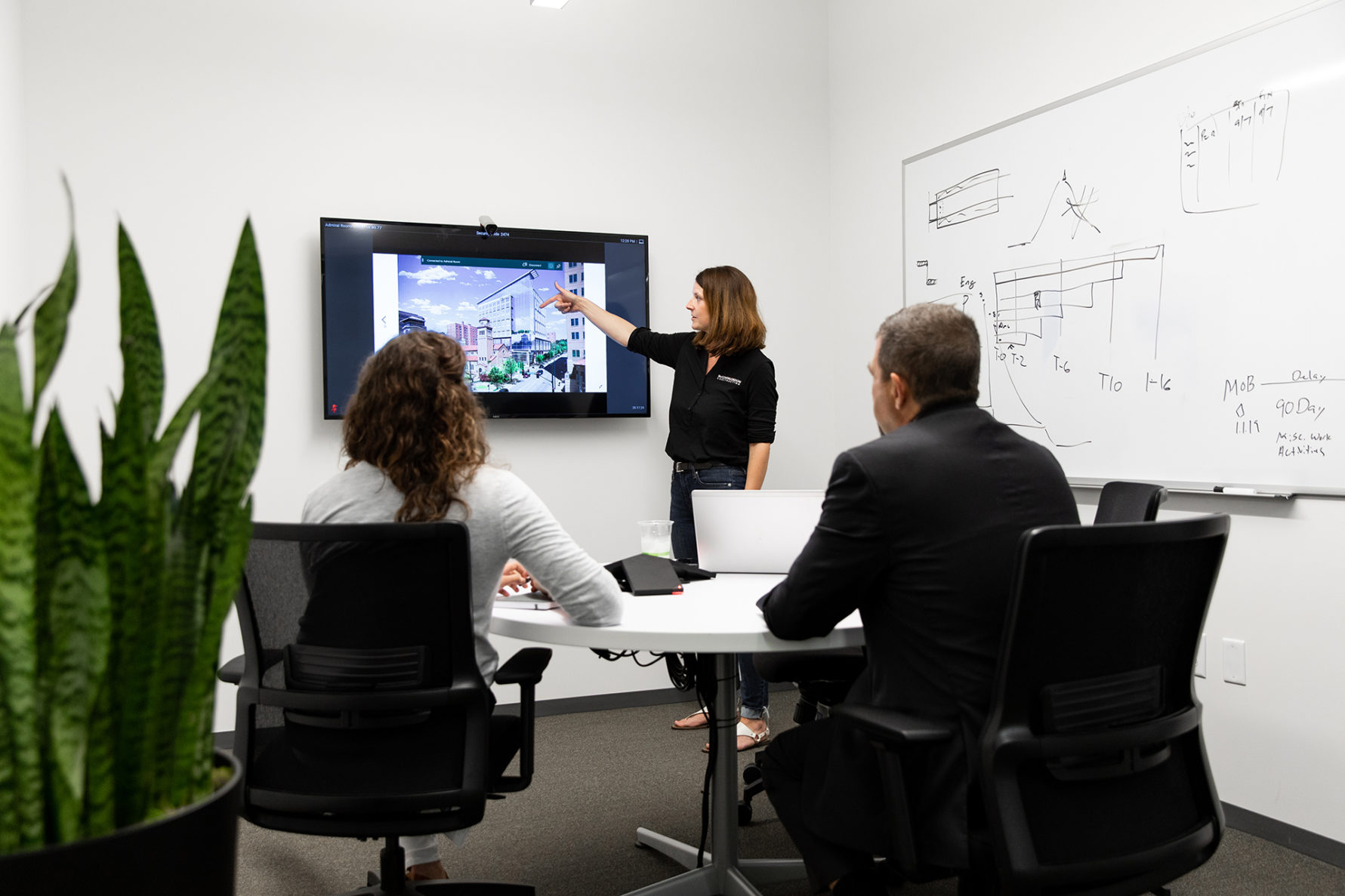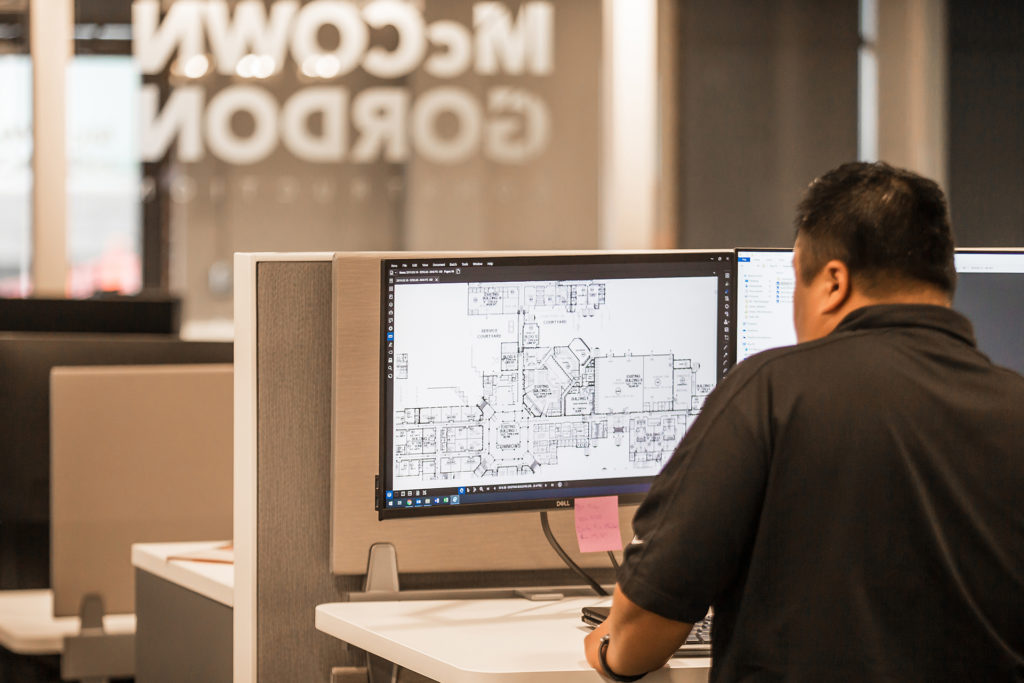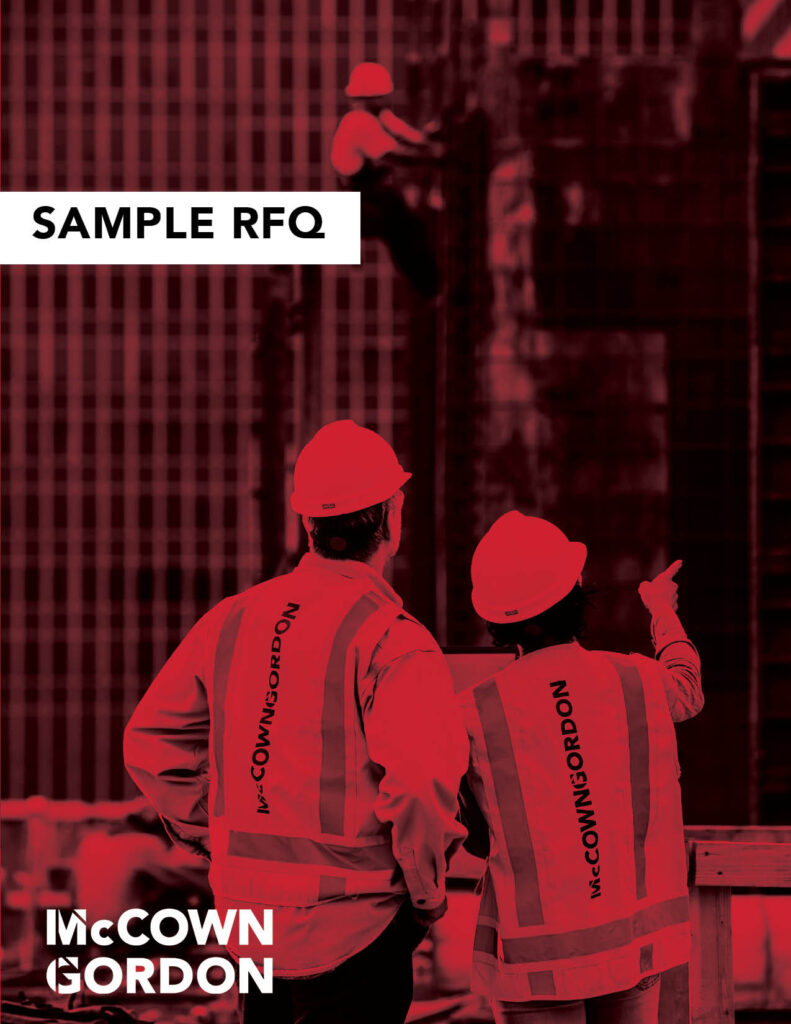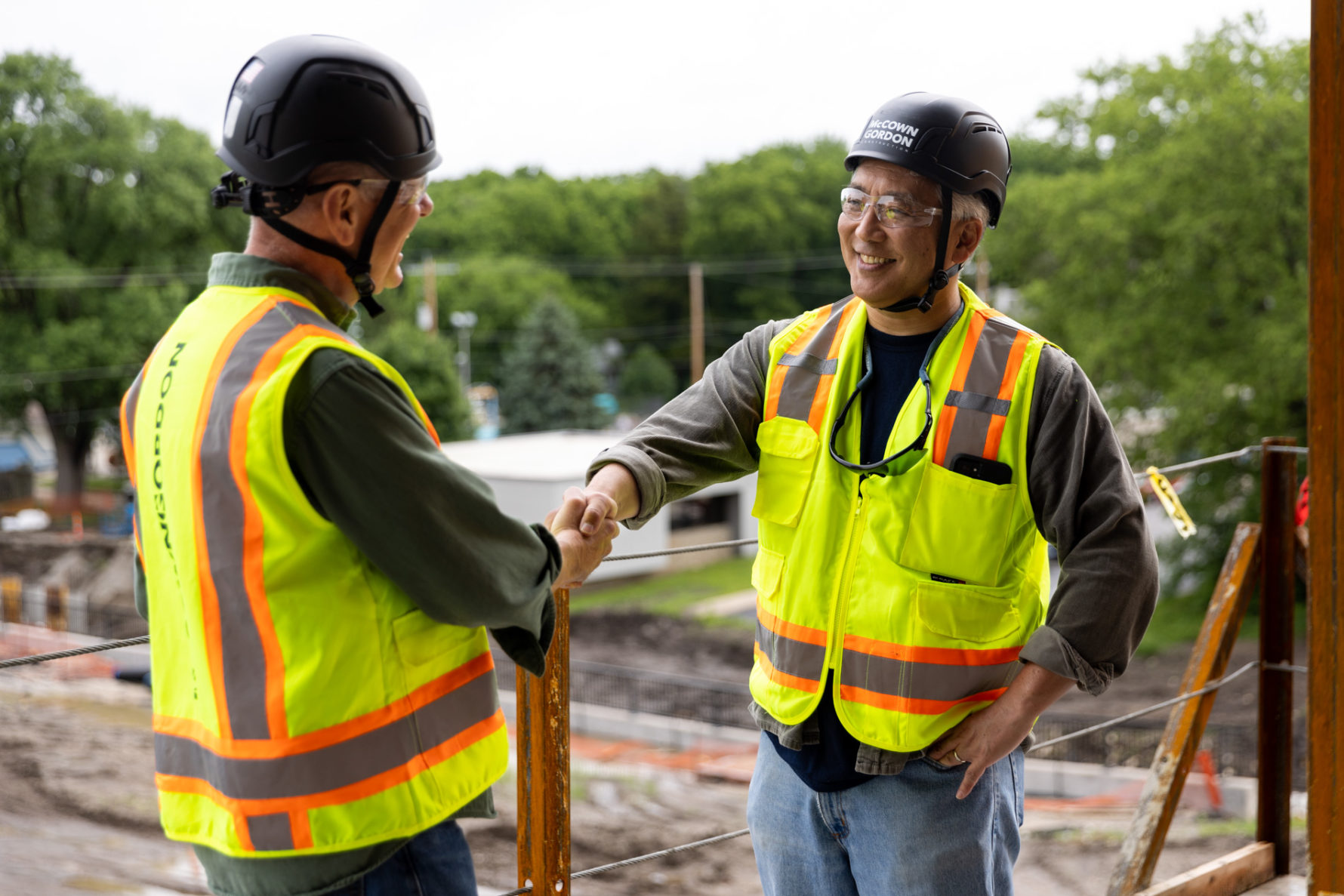What is an RFQ and RFP in construction?
Request for proposals at McCownGordon Construction

An RFQ/RFP (request for qualifications/proposal) in construction is an important document to ask construction managers to submit proposals for your project. This process allows you to determine whether or not they have the necessary qualifications, experience, resources and creativity to bring your project to life.
Before your construction project begins, sending out a request for proposals helps you decide which construction management firm will provide the best results for your needs. For those who are new to the process, understanding how RFPs work may prove a little difficult. However, as leaders in the industry, McCownGordon Construction remains a resource to help you along the way.
Read on to learn more about the ins and outs of the construction RFP process.
When should I start the RFQ/RFP process?
As a first step, you will want to decide on a delivery method for your project. Common methods you could choose from include:
- Design-Bid-Build
- Design-Build
- Construction Manager at Risk
- Integrated Project Delivery
For more details on delivery methods, read our in-depth guide. →
Once you choose the right delivery method that considers your budget, schedule, expertise and project complexity, you gain an idea of what you need in a construction management firm.
Typically, you want to give at least two weeks for firms to respond to your RFP with their proposals. More complex projects or design-build submissions require even more time—up to a few months. Ideally, you want to give construction firms enough time to answer your RFP questions well and put their best foot forward so you can evaluate quality responses.
No matter the size of the project, we recommend requesting proposals in time to bring on a construction firm during preconstruction. The earlier you can hire a construction firm during the design process, the better. Our preconstruction services help streamline design, budget, schedule—everything necessary to create a high-quality product. This allows everyone to be on the same page so when it’s time to build, unforeseen errors are less likely to happen.
Basic information to know about the RFQ and RFQ process before you get started
Before you get started, you should research and understand your state statutes that deal with RFPs and RFQs. If you ever have questions, McCownGordon can be your resource. We can help you figure out your state statutes and how they will affect your construction process. At the end of the day, you want to make sure you are following state procedures for sending out RFPs and evaluating and selecting your construction manager. That will ensure the process goes as smoothly as possible.
You can publicly list your RFPs for any firm to respond, or you can send them to a select list of firms. There are pros and cons to either route. For example, you may receive more responses if anyone is allowed to submit a proposal, but some may be of lesser quality. With a select list, you are immediately limiting your options, but a strong list of competitors can motivate more sophisticated firms.
How long it takes to receive a response depends on the complexity of your project and the questions you asked. However, your RFPs should always be returned by the due date you designated in the document. As you wait, remember that responding to RFPs takes a construction company time, money and a lot of effort. We want to make sure we answer each question thoroughly.
Understanding what to include in your RFP and questions to ask

Finding the right construction company for your build depends on asking the right questions. You don’t want to include anything in your RFP that isn’t pertinent to your goals and what you need.
RFP Process Best Practices for Construction Projects →
In some cases, you will have two steps in soliciting a construction firm: an RFQ and an RFP. (You can even have a third step, which includes interviews with a short-list of firms.) The first step is an RFQ (request for qualifications), which may come before the request for proposals or you may decide to send out the RFQ and the RFP together in one document.
What is the difference between an RFQ and an RFP?
You can think of an RFQ as the first screening. This is the time when you ask basic questions to gain insight on a firm’s experience and capabilities. If you do this separately, this allows you to narrow down to a few companies (short-list), saving you from sending a more detailed RFP to unqualified candidates. This would include making inquiries such as:
- Detail your firm information, including an overview, office locations and brief history
- Outline the relevant experience your company has in X industry.
- Provide references from past similar projects.
- Provide information on the financial status of your firm and evidence of your bonding capacity.
- Tell us why you should be selected for this project.
From there, the RFP delves deeper to differentiate between a company that can achieve the best outcomes from one that possibly can’t. The goal is to ask questions that validate and verify what a company can accomplish and find a firm that will work well with your team.
While you and your team can decide on the information needed, we have compiled a list of inquiries you may want to consider.
Describe your management approach and how you will execute the project throughout the process.
It’s one thing for a company to come up with a good idea, but if they do not offer a clear path toward execution, that idea may not come to fruition. McCownGordon always lays out a clear plan and unique project approach, and we never offer an idea we don’t believe our associates can execute.
You may include specifics here about the firm’s preconstruction services, communication approach and quality control measures. You want to get an idea of what it’s going to be like working with this firm and make sure they will be a great partner for your construction project.
List your previous experience building similar projects with X delivery method.
Seeing if the construction firm has built projects of similar size and complexity in the past helps give you an idea of their capabilities to build your project. If you do a one-step process with just an RFP or if you didn’t ask about experience in the first step, be sure to ask about it now. References are also a great resource to ask about from past experiences.
Provide resumes for your key personnel that will work on my project.
Getting to know the team members that will help complete your construction project is a big deal. You want an experienced team that knows how to work well together. Ask to see resumes for key players like the preconstruction manager, the project manager and the jobsite superintendent.
Detail your firm’s ability to collaborate and partner with design firms.
The connection between architects and the construction management company is crucial at the early stages of your project. During the preconstruction phase we ensure the architect’s design stays within budget. Through our building performance solutions team, we also act as the connection between the designer and your engineering firm to verify all components come together before construction begins.
Outline your method for cost estimation and your cost estimating capabilities.
Accurate cost estimates are key to adhering to the budget. You don’t want an estimate to be so off base that you’re forced into a financial corner. One benefit of working with McCownGordon is our real-time estimating technology. Our tools give direct insight on how changes in design can impact the overall budget. This allows owners to see the ramifications of their decisions before they make their final choice.
With the innovative technology we use throughout the entire project, we build 3D models and use estimating tools to pull data based on those models. This allows us to more easily update design changes, find areas we could improve and offer in-depth guidance on how much your build will cost.
You also want to make sure your construction company strives to make the most out of your budget. Starting with preconstruction, we collaborate with the design team, owner, contractors and our own associates to make the design as cost efficient as possible. With our “value engineering” approach, we ask, “Are there alternative solutions that will bring more short-term and long-term value?” At the end of the day, we want to help you spend your money wisely.
Provide a preliminary project schedule.
Budgeting your time is just as important as budgeting your finances for a construction project. In fact, if a build doesn’t align on a proper schedule, you could end up spending a lot more money than you initially expected!
Provide a summary of your safety program and requirements for X industry.
With any kind of construction project, safety requirements should always remain at the forefront of everything your construction company does. For all of our builds, we implement a site-specific safety plan catered to your project’s unique factors.
Describe your current financial status and provide evidence.
This is a question you may not think to ask, but it is definitely important. If you don’t include it in the first step for qualifications, be sure to ask it in the RFP. There are three main financial factors you may want to consider:
-
- Financial standing: You want to choose a company that is in good financial standing. If they are overextended or in major debt, that could be a red flag.
- Bond capabilities: Asking for a construction company’s bonding capabilities is crucial. This allows you to understand how protected you would be against financial losses. It also proves the construction firm is committed to finishing the project based on contractual terms.
- Insurance coverage: If anything were to happen, you want to make sure the company has insurance coverage. Without it, you may have to pay a lot of money out of pocket for unseen events.
Provide construction fees.
You can also ask for the construction fee in your RFP (as long as state statutes allow this). However, qualifications should always outweigh the fee if you want the best results. As a guideline, when making your decision, 75 percent of your choice should rest on qualifications, and 25 percent should focus on the fee proposal. Including specific criteria for the fee is very important to ensure you are comparing the same items included in fees from different companies. The overall fee typically has three categories:
-
- Preconstruction services fee (lump-sum fee)
- Base fee (usually a percentage of the total project cost)
- Supervision and management costs (depending on the project, it could be a lump-sum fee or percentage of costs)
Once you have an idea of which companies you are leaning toward, you can set up an interview process to make your final selection. When you meet with McCownGordon, we take the opportunity to engage with you, further understand your goals and explain the answers we gave.
Learn more about RFPs in construction with McCownGordon Construction
At McCownGordon, our team of builders and engineers maintain a customer-focused mentality, allowing us to outperform even your highest expectations. Dedicated to promoting integrity, performance and relationships, it’s our people and values that truly make the difference.
Our customers aren’t simply another project; they’re an extension of our team and community. Together, we don’t just build—we bring creative visions to life. From first thought to final nail, we deliver quality work to ensure our builds stand above the rest.
We have four offices —Kansas City, DFW, Manhattan and Wichita. Call us at 888-304-4929 or use our free online quote tool to start building today.

A SAMPLE RFQ TO HELP EASE YOUR SELECTION PROCESS
Even though you may be familiar with the construction RFQ process, reviewing and cross-referencing your standard process with our sample can help you enhance your request for qualification document.


